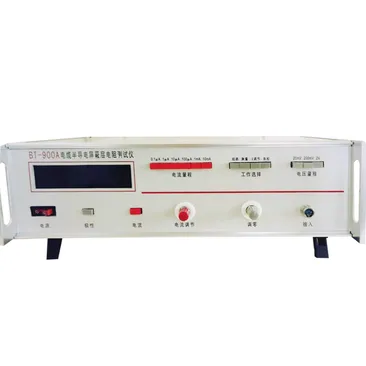Top Suppliers for Electrical Resistance Testing Equipment and Tools
Understanding Electrical Resistance Testers and Their Suppliers
Electrical resistance testers, also known as ohmmeters, are essential tools in various industries, including electrical engineering, manufacturing, and telecommunications. These instruments are vital for ensuring the integrity and functionality of electrical systems. An electrical resistance tester measures the resistance of electrical circuits, enabling technicians and engineers to identify issues such as short circuits, grounding problems, and faulty connections. This article explores the types of electrical resistance testers, their applications, and factors to consider when selecting suppliers of these critical tools.
Types of Electrical Resistance Testers
Electrical resistance testers come in several types, each designed for specific applications. The most common types include
1. Digital Resistance Meters These testers use digital displays to show resistance values and often come equipped with data logging capabilities. They are user-friendly and provide accurate readings, making them ideal for electricians and engineers.
2. Analog Resistance Meters Using a needle gauge to indicate resistance, analog meters are simpler yet effective tools. While they may not offer the precision of digital testers, they can still be valuable in specific contexts, particularly for troubleshooting older systems.
3. Megohmmeters Also known as insulation testers, megohmmeters are designed for measuring high resistance levels, particularly in insulation materials. They are crucial for ensuring that electrical systems are safe and compliant with standards.
4. Clamp Meters Some modern clamp meters incorporate resistance measurement capabilities along with current and voltage testing. These versatile tools can quickly assess electrical systems without the need to disconnect wires.
Applications of Electrical Resistance Testers
Electrical resistance testers have a broad range of applications across various fields. Key uses include
- Electrical Maintenance Regular testing of electrical equipment helps in identifying potential problems before they escalate
. By measuring resistance, technicians can ascertain the health of insulation and identify deteriorating components.- Telecommunications In telecommunications infrastructure, resistance testing ensures that cables and connections maintain adequate performance levels, vital for data integrity and signal quality.
electrical resistance tester suppliers

- Manufacturing In production environments, resistance testers can validate the functionality of components and assemblies, preventing defective products from reaching consumers.
- Renewable Energy As the use of renewable energy systems like solar panels and wind turbines increases, resistance testing helps maintain the integrity and efficiency of these systems.
Selecting Suppliers of Electrical Resistance Testers
Choosing the right supplier for electrical resistance testers is crucial for obtaining quality tools that meet specific needs. Here are several factors to consider
1. Reputation A supplier with a strong reputation in the industry is often a reliable choice. Look for reviews, testimonials, and ratings from other customers.
2. Product Range Evaluate the supplier’s product range to ensure they offer the type of resistance tester you need. A diverse inventory indicates that the supplier understands the various requirements of different industries.
3. Quality Assurance Ensure that the supplier complies with industry standards and provides products that undergo rigorous quality testing. Look for certifications that validate product quality.
4. Technical Support Suppliers that offer solid customer service and technical support can be invaluable, especially when troubleshooting issues or needing guidance on specific products.
5. Training and Resources Some suppliers provide training resources and materials, which can help users effectively utilize their products. This feature can be beneficial for organizations looking to enhance their staff's skills.
6. Pricing and Warranty Compare prices among different suppliers, but don’t compromise on quality for a lower price. Also, check warranty options, as reputable suppliers typically offer guarantees on their products.
Conclusion
Electrical resistance testers are indispensable tools that play a critical role in maintaining the safety and efficiency of electrical systems. By understanding the different types of testers available and their applications, users can make informed choices. When selecting suppliers, factors such as reputation, product range, and support services should guide the decision-making process. With the right tools and suppliers, professionals can ensure reliable and efficient electrical operations.
-
Why the Conductor Resistance Constant Temperature Measurement Machine Redefines Precision
NewsJun.20,2025
-
Reliable Testing Starts Here: Why the High Insulation Resistance Measuring Instrument Is a Must-Have
NewsJun.20,2025
-
Flexible Cable Flexing Test Equipment: The Precision Standard for Cable Durability and Performance Testing
NewsJun.20,2025
-
Digital Measurement Projector: Precision Visualization for Modern Manufacturing
NewsJun.20,2025
-
Computer Control Electronic Tensile Tester: Precision and Power for the Modern Metal Industry
NewsJun.20,2025
-
Cable Spark Tester: Your Ultimate Insulation Assurance for Wire and Cable Testing
NewsJun.20,2025
 Copyright © 2025 Hebei Fangyuan Instrument & Equipment Co.,Ltd. All Rights Reserved. Sitemap | Privacy Policy
Copyright © 2025 Hebei Fangyuan Instrument & Equipment Co.,Ltd. All Rights Reserved. Sitemap | Privacy Policy
